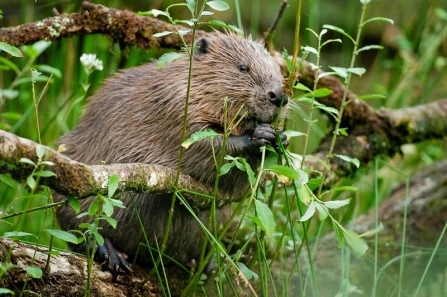A charity which has pioneered the successful reintroduction of beavers to a Devon river is asking the public to back calls for a wider return of the animals to other parts of England.
In August 2020 the Department for Farming and Rural Affairs (Defra) granted permission for a population of wild beavers to remain living free on the River Otter in East Devon. The decision came after a five-year trial (2015-2020) led by the charity Devon Wildlife Trust had shown the mammal’s positive impacts on local nature, water quality and flood alleviation.
Now Defra is asking the public whether they wish to see beavers reintroduced to other rivers in England. The consultation is now open to anyone to respond to with their views on what the future of beavers should be.
The East Devon beavers were the first wild colony of the ‘semi-aquatic mammals’ to have bred in England since they were hunted to extinction more than 400 years ago. There are now thought to be 20 beaver families living in the River Otter and its tributaries.
Harry Barton, Devon Wildlife Trust Chief Executive, said:
“Beavers are the most amazing animals, capable of transforming our rivers and wetlands for the better. Our work on the River Otter Beaver Trial, and the work of The Wildlife Trusts in Scotland and elsewhere, has shown that these natural engineers can provide an impressive range of services from storing climate-changing carbon to flood alleviation. Our experience has also shown that beavers can thrive in a modern landscape, and that we can live happily side by side with these fascinating and engaging creatures. We believe it’s a top priority for nature’s recovery to see their return to rivers across the UK.
Beavers are wild animals and will need managing. So it’s vitally important that we reintroduce them in a planned and sensible way, and that we have a toolkit of management techniques available so we know exactly how to deal with issues if and when they arise. And if we want to maximise the benefits beavers can bring, farmers and land managers will need supporting with advice and incentives to make space for the valuable wetlands they create.
The Wildlife Trusts have been calling for an ambitious national plan for beavers for some time, so I’m delighted to see the launch of the consultation today. This is the start of a vitally important conversation about the future of these once widespread animals, and I would urge anyone who cares about their future in the English landscape to respond.”
Devon Wildlife Trust, which has more than 40,000 supporters, plans to base its own response to Defra’s consultation around four key asks:
- Formally recognise beavers as a resident native species in England, as has already been done in Scotland.
- Ensure beaver populations thrive in the wild by supporting carefully targeted reintroduction projects, bolstering populations where necessary to ensure their long-term health.
- Help landowners to make space for watercourses and wetlands created by beavers by providing appropriate schemes and funding programmes.
- Adopt systems of management that ensure beavers are properly protected in a flexible and simple way that avoids excessive administrative burdens on land-managers and regulators.

